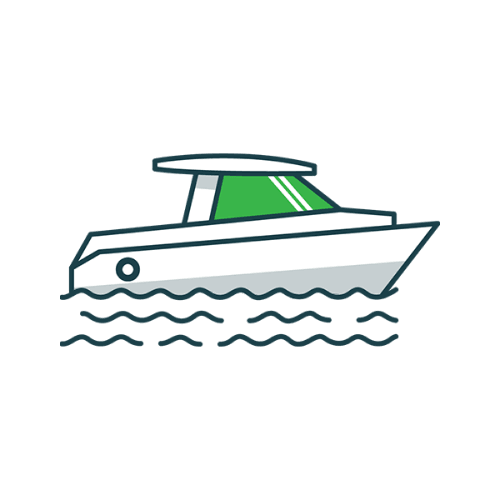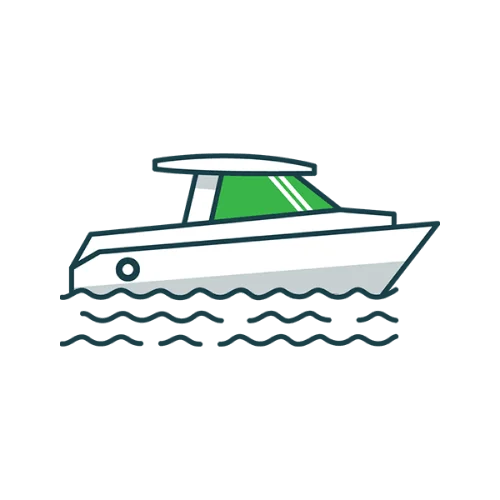North Carolina Boat Insurance
- Boat
- /
- North Carolina Boat Insurance
Boasting over 50 lakes in addition to Atlantic coastal access, it’s no surprise boating in North Carolina is one of the most popular recreational activities in the state. Perhaps unsurprisingly, there are over 300,000 boats registered in North Carolina.
While always scenic, the waters aren’t always safe. Boating is an inherently dangerous activity, and even the most responsible vessel operator can experience boat damage, whether they’re on the water or not.
Boat insurance is always a wise investment. In North Carolina, there are a few risks distinct to the state that boaters should know. Let’s take a look at some North Carolina boat insurance considerations and factors so you can be fully informed before you buy a policy.
North Carolina Boat Insurance Coverages
It’s important to know the possible coverage options for boat insurance in North Carolina, as well as understand the risks that can affect your policy. Boat insurers in North Carolina need to worry about the weather a bit more than those in some other states, for instance.
Boat insurance in North Carolina can generally be divided into two categories: liability protection and physical damage protection. Both together can be considered comprehensive boat insurance. However, since boat insurance is highly customizable by nature, there are usually many possible aspects of coverage that can make up plans. We’ll go over some of them here.
Liability Coverage
Liability insurance for boaters covers injuries or property damage to others in an accident you’re at fault for. If you accidentally collide with someone (or someone’s property), liability coverage allows your insurer to step in so you don’t have to pay out of your pocket to fix the damages.
Liability insurance for boats often includes fuel spill coverage, which can pay to remedy damages that are caused by a fuel or oil spill after an accident. Liability coverage may also include wreckage removal, which can help cover the costs to raise or remove your mangled boat if you need to. Check with your provider on the specifics of these coverages in your policy.
Make sure your insurer knows if you plan to use your boat for water sports, too. Not every carrier will cover injuries that occur during waterskiing and wakeboarding, for example. Be aware of this before you plan on joining in any water sports fun on Lake Norman or any of the other state’s lakes.
Common liability limits are $250,000 or $500,000, although you may want more depending on your financial situation and vessel. Liability insurance may be purchased as a stand-alone policy. Be aware, though, that if you only have liability insurance, your insurance company won’t recoup you for any damages your boat suffers in an accident. Liability insurance only covers injuries and property damage to others.
Comprehensive Coverage
To protect the value of your vessel, you’ll need insurance that covers physical damage to your boat. This can be achieved through a comprehensive boat insurance policy, which generally covers damage from theft, vandalism, collisions, sinking, fires, and more.
Many boat insurance policies cover damage from severe weather, but you’ll need to double-check with your provider to be sure of the circumstances when you’re covered. Hurricanes are a concern in North Carolina. You may be surprised to hear, but the Tar Heel state has been hit by the third-most hurricanes of all the states since the Atlantic hurricane season began being monitored in about 1851.
Your insurer may want you to take certain precautions during a hurricane, like hauling your boat and storing it. You may also not be allowed to take your boat into Florida or parts of the Caribbean during hurricane season and receive coverage for your trip.
North Carolina Boat Insurance Policy Considerations
Some policies have navigational limits, outside of which you won’t receive coverage whether it’s hurricane season or not. For example, your policy may not cover you if you travel more than 75 miles offshore. You should always be covered for inland boating in the many lakes and rivers around the state, though.
As you’ll know if you live there, temperatures can drop almost overnight in North Carolina. Although it’s probably not cold enough often enough to winterize your boat in the cold months, know that your policy may not cover damage from freezing if there’s negligence on your part. Be sure to take proper care of your boat during the winter, especially if you have an inboard motor.
Absentee ownership may also be a factor in North Carolina boat insurance. Vacation homes are relatively common in the state, but some boat insurance companies may not want you to leave your boat unattended for months at a time since there’s no one to prevent thefts or mitigate damage. They may raise your rates if you plan on this.

Don’t get sunk by unexpected damages. Keep your vessel safe with a policy from one of the nation’s top carriers.
Does North Carolina Require Boat Insurance?
There are no North Carolina boat insurance requirements by law. However, a lender may mandate some coverage if you’ve financed your boat, and marinas or boatyards may require some liability coverage before you’re allowed to store your boat.
Unlike car insurance, boat insurance is never required by law in North Carolina. You are required, though, to register your boat and typically carry some safety equipment onboard. All motorized vessels, including jet skis, must be registered if used on public waters. And, sailboats over 14 feet long at the waterline must be registered.
How Much Is Boat Insurance in North Carolina?
You can generally get boat insurance in North Carolina for a few hundred dollars a year, but exact rates vary greatly depending on many factors. Vessel age and size are important, as well as the method of storage, policy type, and more.
Vessel Age and Size: Normally, bigger boats cost more to insure than smaller boats. Bigger boats are more expensive to rebuild, thus more expensive to cover. Also, especially old or vintage boats may cost more to cover, as unique parts or features could be hard to replicate in repairs.
Method of Storage: How you store your boat is also important. Insurers may look more favorably on those who store their boat inside a locked garage where a vessel is protected from the elements and theft than those who keep their boat on their trailer outside in their backyard.
ACV vs Agreed Value: One of the most direct factors that can influence your North Carolina boat insurance premium, though, is the way you cover your boat in your policy. In terms of boat insurance, North Carolina plans are usually written with either agreed-value coverage or actual cash value coverage. Actual cash value coverage covers less, but it’s usually cheaper.
Actual cash value coverage factors in depreciation, which means you’ll receive a smaller reimbursement for damage the older your boat is. Agreed-value coverage doesn’t factor in depreciation. You’ll receive the same payout, which is typically around the market value of your boat when you got the policy, no matter when you file a claim.

Don’t get sunk by unexpected damages.Keep your vessel safe with a policy from one of the nation’s top carriers.
The editorial content on Clovered’s website is meant to be informational material and should not be considered legal advice.
